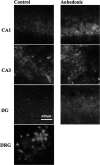Candidate hippocampal biomarkers of susceptibility and resilience to stress in a rat model of depression
- PMID: 22311638
- PMCID: PMC3394954
- DOI: 10.1074/mcp.M111.016428
Candidate hippocampal biomarkers of susceptibility and resilience to stress in a rat model of depression
Abstract
Susceptibility to stress plays a crucial role in the development of psychiatric disorders such as unipolar depression and post-traumatic stress disorder. In the present study the chronic mild stress rat model of depression was used to reveal stress-susceptible and stress-resilient rats. Large-scale proteomics was used to map hippocampal protein alterations in different stress states. Membrane proteins were successfully captured by two-phase separation and peptide based proteomics. Using iTRAQ labeling coupled with mass spectrometry, more than 2000 proteins were quantified and 73 proteins were found to be differentially expressed. Stress susceptibility was associated with increased expression of a sodium-channel protein (SCN9A) currently investigated as a potential antidepressant target. Differential protein profiling also indicated stress susceptibility to be associated with deficits in synaptic vesicle release involving SNCA, SYN-1, and AP-3. Our results indicate that increased oxidative phosphorylation (COX5A, NDUFB7, NDUFS8, COX5B, and UQCRB) within the hippocampal CA regions is part of a stress-protection mechanism.
Figures






Similar articles
-
Changes in brain metabolites related to stress resilience: Metabolomic analysis of the hippocampus in a rat model of depression.Behav Brain Res. 2019 Feb 1;359:342-352. doi: 10.1016/j.bbr.2018.11.017. Epub 2018 Nov 14. Behav Brain Res. 2019. PMID: 30447240
-
iTRAQ-based quantitative analysis of hippocampal postsynaptic density-associated proteins in a rat chronic mild stress model of depression.Neuroscience. 2015 Jul 9;298:220-92. doi: 10.1016/j.neuroscience.2015.04.006. Epub 2015 Apr 9. Neuroscience. 2015. PMID: 25862978
-
iTRAQ-based proteomics suggests LRP6, NPY and NPY2R perturbation in the hippocampus involved in CSDS may induce resilience and susceptibility.Life Sci. 2018 Oct 15;211:102-117. doi: 10.1016/j.lfs.2018.09.016. Epub 2018 Sep 7. Life Sci. 2018. PMID: 30201296
-
Chronic stress, depression and antidepressants: effects on gene transcription in the hippocampus.Rev Neurosci. 2005;16(1):43-56. doi: 10.1515/revneuro.2005.16.1.43. Rev Neurosci. 2005. PMID: 15810653 Review.
-
The hippocampus in stress susceptibility and resilience: Reviewing molecular and functional markers.Prog Neuropsychopharmacol Biol Psychiatry. 2022 Dec 20;119:110601. doi: 10.1016/j.pnpbp.2022.110601. Epub 2022 Jul 13. Prog Neuropsychopharmacol Biol Psychiatry. 2022. PMID: 35842073 Review.
Cited by
-
Emerging Roles of NDUFS8 Located in Mitochondrial Complex I in Different Diseases.Molecules. 2022 Dec 9;27(24):8754. doi: 10.3390/molecules27248754. Molecules. 2022. PMID: 36557887 Free PMC article. Review.
-
A Preliminary Quantitative Electron Microscopic Analysis Reveals Reduced Number of Mitochondria in the Infralimbic Cortex of Rats Exposed to Chronic Mild Stress.Front Behav Neurosci. 2022 May 4;16:885849. doi: 10.3389/fnbeh.2022.885849. eCollection 2022. Front Behav Neurosci. 2022. PMID: 35600987 Free PMC article.
-
Alterations in Plasma microRNA and Protein Levels in War Veterans with Chronic Mild Traumatic Brain Injury.J Neurotrauma. 2020 Jun 15;37(12):1418-1430. doi: 10.1089/neu.2019.6826. Epub 2020 Mar 11. J Neurotrauma. 2020. PMID: 32024417 Free PMC article.
-
Sex Influences Genetic Susceptibility to Depression-Like Behaviors in Chronic Unpredictable Mild Stress-Exposed Wistar Rats.Mol Neurobiol. 2024 Jul 16. doi: 10.1007/s12035-024-04348-5. Online ahead of print. Mol Neurobiol. 2024. PMID: 39012445
-
iTRAQ-Based Quantitative Proteomics Suggests Synaptic Mitochondrial Dysfunction in the Hippocampus of Rats Susceptible to Chronic Mild Stress.Neurochem Res. 2018 Dec;43(12):2372-2383. doi: 10.1007/s11064-018-2664-y. Epub 2018 Oct 22. Neurochem Res. 2018. PMID: 30350262
References
-
- Kessler R. C. (1997) The effects of stressful life events on depression. Annu. Rev. Psychol. 48, 191–214 - PubMed
-
- Green K. T., Calhoun P. S., Dennis M. F., Beckham J. C. (2010) Exploration of the resilience construct in posttraumatic stress disorder severity and functional correlates in military combat veterans who have served since September 11, 2001. J. Clin. Psychiatry 71, 823–830 - PubMed
-
- Kendler K. S., Karkowski L. M., Prescott C. A. (1999) Causal relationship between stressful life events and the onset of major depression. Am. J. Psychiatry 156, 837–841 - PubMed
-
- Hjemdal O., Vogel P. A., Solem S., Hagen K., Stiles T. C. (2010) The relationship between resilience and levels of anxiety, depression, and obsessive-compulsive symptoms in adolescents. Clin. Psychol. Psychother. 18, 314–321 - PubMed
-
- Haeffel G. J., Vargas I. (2011) Resilience to depressive symptoms: The buffering effects of enhancing cognitive style and positive life events. J. Behav. Ther. Exp. Psychiatry 42, 13–18 - PubMed
Publication types
MeSH terms
Substances
LinkOut - more resources
Full Text Sources
Miscellaneous

